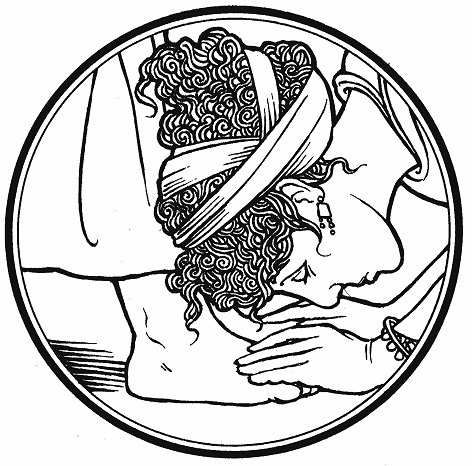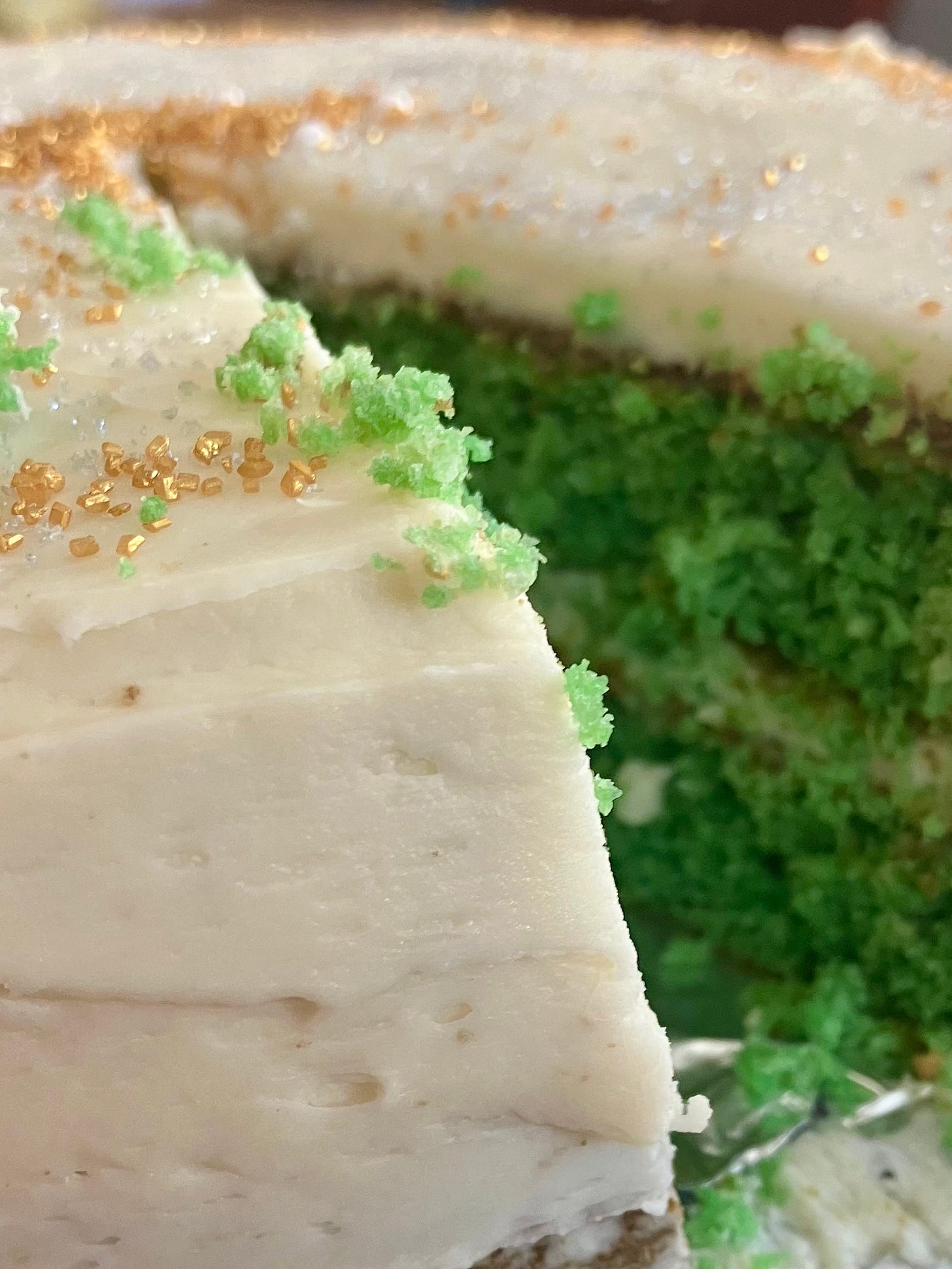“I’d like to make a green cake.”
It was Sunday afternoon, last week, the day before St. Patrick’s Day. Our oldest daughter, invariably looking for an excuse to bake something sweet, landed on Ree Drummond’s red velvet cake recipe.1 Except she didn’t plan to use red food coloring. Nope, she was going to go all out shamrock and leprechaun. This was going to be a green velvet cake. We were eating our traditional corned beef and cabbage that evening, due to a busy Monday, so she wanted to dress up our little celebration of the famous Irish saint with a fancy—and unique—dessert.
I’ll admit I had my hesitations. There’s one great reason (aside from others) Sam-I-am was loath to try the famous emerald eggs and ham, I think. Besides spinach or asparagus or spring peas, or limes and Granny Smith apples, few foods look, well, palatable when they’re grass-colored. Think old bread: honestly, that’s probably about as far as you want to think of not-naturally-green foods.
But our oldest girl was set and determined. This cake was going to happen. She dove into baking as I puttered, finally leaving the kitchen to her fledgling yet insistent effort.
She reminded me a little of the woman we’d heard about that morning in the Reminiscere Gospel reading, Matthew 15:21-28.
21 Then Jesus went out from there and departed to the region of Tyre and Sidon. 22 And behold, a woman of Canaan came from that region and cried out to Him, saying, “Have mercy on me, O Lord, Son of David! My daughter is severely demon-possessed.”
23 But He answered her not a word.
And His disciples came and urged Him, saying, “Send her away, for she cries out after us.”
24 But He answered and said, “I was not sent except to the lost sheep of the house of Israel.”
25 Then she came and worshiped Him, saying, “Lord, help me!”
26 But He answered and said, “It is not good to take the children’s bread and throw it to the little dogs.”
27 And she said, “Yes, Lord, yet even the little dogs eat the crumbs which fall from their masters’ table.”
28 Then Jesus answered and said to her, “O woman, great is your faith! Let it be to you as you desire.” And her daughter was healed from that very hour.

Every year, I hear this story again in Lent, and I thank God for this woman. She is pleading and desperate. She is insistent. Sometimes desperation makes us reckless, like throwing spaghetti at a wall. What will stick? But even when we are desperate, I think our minds crave some measure of plausibility. There must be a small chance, a hair’s breadth, an iota of real potential in this possibility. Her desperation carried her to words, incredible ones of incredible tidings, that gave her insistent hope.
And there we see this Gentile woman’s faith that God has given her. In the chapter just before this, Matthew 14, Jesus has performed miracles—fed the 5,000, walked on water, healed the sick in Gennesaret. He has done the impossible. Maybe this woman saw these things with her own eyes, but most probably she didn’t. Her only knowledge of Jesus would’ve come from gossip, the kind of news that spreads like wildfire, travelers to locals, neighbor to neighbor, words spreading and sowing. “Have you heard of the prophet? You’ll never guess what he did…” And in her, faith came by hearing, a scrap of a tale from elsewhere, a tiny priceless seed through her unclean ears. Because, of course, she was not of the house of Israel. She was not, and couldn’t be, a part of a family to which she’d never been born.
Or could she? Jesus, in fact, has come to save the whole world. In his dismissive comments, you can almost feel the ring of suppressed laughter, the punch line that He’s holding back. For He knows that this woman does hold Him, despite her tainted blood.2 Her faith, the one the Holy Spirit had given her, has made her relentless. And this is key; her faith has made her humble. And in her humility, this woman embraces her lowliness, her undeserved status. She is a dog, not even a person, at her Master’s table. And yet she knows the crumbs are for her, too. Those bits, so insignificant looking, bear blessings that dwarf every good thing in this world. His Word is Truth, and it yields towering trees, from the smallest pips. The vines twinning upwards from the stump of Jesse now wrap themselves around Him. He hears His own promises return to Him.
So this woman’s comeback is mighty. It stems from the unfurling branches of a desperate, relentless hope, circling back to the One from which it came. “You have done wonders; You can do them again, even unto one so low as me.” And even further than her—to her daughter. And from her, to all of us.
I think St. Patrick must’ve cherished the mud beneath his filthy toes, his worn and calloused feet treading mile upon mile under the soft rain and vivid hills of Ireland. He would’ve known how small each speck of dirt was, how low, how forgettable. And yet the firmament that carried him had also been the road upon which the God of the universe trod. Jesus, too, had walked and witnessed, in dust and valleys, bearing dust Himself in His body and taking upon ours. Here his poor pilgrim was, this little man, under the canopy of heaven, in a lost and pagan place, also immersed in the clods and the decay, and yet how wide and strong and wonderful was the Word he proclaimed. It would bring life. It would change that world.
So too a young woman, a nobody, visited in a nothing place by a messenger of the universe. And what did this angel say? “For with God nothing will be impossible.” Artists and believers alike have pictured Mary, her knees upon the ground, her hands receptive. “Behold the maidservant of the Lord! Let it be to me according to your word.”3 How was that, again? Humility and echo. “According to your word.” She receives and believes, her frail and mortal body shedding dust as she confesses, and the whole world is blessed forever. Christ, lowly born of this lowly virgin, first infinitesimally incarnate, grown to a babe, then a man. The Word made flesh come to be Love to us, then, now and forever.
So much of our lives are stumbles, flawed and broken steps upon our flawed and broken earth. And yet the Word crumbs that we are given, that pass between the thin pages beneath our fingers, that go in our ears and fall on our tongues, are the root of all joy, all healing, all eternity before us. “Listen! As the Father hath loved the Son, so hath Jesus Christ, Thy Savior, loved Thee,” writes Pr. Zorn in a Lenten devotion4, “Listen!
If thou keepest, and holdest fast to, His Word and His commandments, thou wilt abide in His love, even as He kept His Father’s commandments and abode in His Father’s love. Bear this in mind as a word spoken to thee by—Jesus. These things He says unto thee in order that His joy might remain in thee, and that thy joy might be full and never end.”
We enjoyed a sunshine supper for St. Patrick’s. After savoring the tender beef and fragrant cabbage, the hearty potatoes and carrots, we ate the cake. It was bright and crumbly, sweet and dense, garnished with fine, gold sprinkles.
We were full. There were even leftover crumbs.
In case you’re really curious, see The Pioneer Woman Cooks for the recipe she used.
In The Lutheran Study Bible, there’s this note after verse 22: “Canaanite. Descendant of the OT race that Israel was ordered to exterminate because of their idol worship (Deut. 20:17).” This wasn’t just a minor ethnic difference with the Jews; this woman was of a people that shouldn’t have even existed due to God’s order.
The annunciation account in Luke 12, verses 6-38.






Thanks so much for this beautiful reflection. Humbly receiving the Word of God is the essence of faithfulness. So simple! Your daughter’s green cake looks more appetizing than expected! ;)
(I’m a bit in awe of the fact that you combined four? readings/holidays in here.)